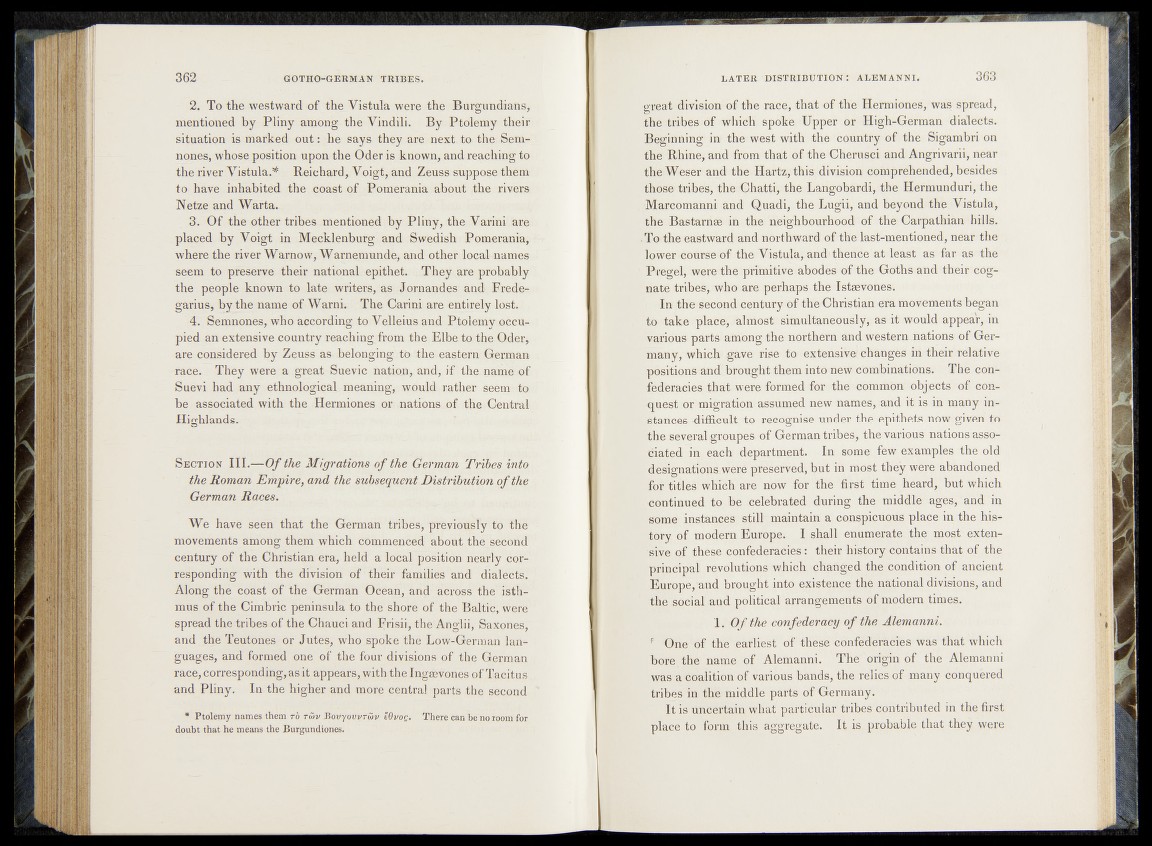
2. To the westward of the Vistula were the Burgundians,
mentioned by Pliny among- the* Vindili. By Ptolemy?ltheir
situation is marked out : "lie says, they are next, .to the^Sem-
nones, whose position upon the Oder is known, and reaching to
the riw* fistu la.* Reichard, Voigt, and Zeusssnpposethero
to have inhabited the coast of Pomerania about the rivers
Netze and Warta*
3. Of the other tribes mentioned by Pliny, the. Varini are
placed by Voigt in Mecklenburg and Swedish ■ Pomeraniay
where the river Warnow, Warnemunde, and other local names
seem to preserve their national epithet.: They vare probably
the people known to late writers, as Joraandes-and Frede-
garius, by the name of Warni. The Carini are entirely-losfoi
4. Semnones, who according to Velleius and Ptolemy joecU-
pied an extensive country reaching from the Elbe to the Oder,
are considered by Zeugsi as-Jielongipgjth &he$eas„tem German«
race. They were a great Suevic nation, and; if «the. name of
Suevi had any ethnological meaning, would rather seem- to
be associated with the Hermiones or nations pf, the, Central-
Highlands.
S e c t io n III.—O f the Migrations o f the German Tribes into
the Roman Empire, and the subsequent d i s t r ibution o f the
German Races.
We have seen that the German tribes, previously tó the
movements aibong them which commenced about thd‘'second
century of the Christian era, held a local position nearly 'éor-
responding with the division of their families and dialedti=p
Along the coast of the Gierman Ocean, and across’the isthmus
of the Cimbrie peninsula to the shore of the Baltic, wérd'
spread the tribes o f the Chauci and Ifrisii, the" Anglii, Saxones,
and the Teutones or Jutes, who .spoke thé Low-German languages,
and formed one of the four divisions of the German
race, corresponding,as it appears, with the Ingsevones of Tacitus
and Pliny. In the higher and more central parts the second
* Ptolemy names, them to t&v S S o tiy o v v r S tit There can be no room for
doubt that he means the Burgundiones,
g^eat-s'divisiomof the race, that of the Hermiones, was spread,
the-tribes of which spoke Upper or High-German dialects.
Beginning in the west with the country of the Sigambri on
the Rhine, and from that of the Cherusci and Angrivarii, near
the Weser and the Hartz, this^.division comprehended, besides ,
those tribes, the rOhatti, the Larigobardi, the Heraranduri, the
•Marcomanni and Quadi, the Lugii, and beyond the Vistula,
the Bastarnse in the'neighbourhood*’of the-Carpathian hills.
,To*the eastward and northward of1 the last-mentioned, near the
Shiver courser of 'the Vistula, ambtherice at-least as’- far-as th e
^ e g e l ; «.were th e primitive ^abodes of the Goths and their cognate
tribes, who are perhaps, the'“Istaevobesi <t
In the^secOnd century ©f the-Christian era movements began
to take pl,ace, 'almost simultaneously,* as it would appea'r, in
various parfcsiath’ofegithe northern andwestermnations of Germany,
which /gave'-Mse to extensive! ‘changes -in their relative
positions and .brought themfint^n'dwJcbmbinati0ns.- The confederacies
jthat were formed for-the commork objects*'of con-"
quest -or migration/assumed -newmames, iahd- it is in piany in-
feancesl ^lifficultrto * recognise-under ■ thf|'fepithets now given to
the severalgippppjs of German tribes', various nations asso-”
^Viated.Tiukeach department. In som^few examples 'the old
| ‘d^igndfidas,w«ie preseivedi bu^in roost they were ’abartdprred
for titles’which are now for the 'first timie heard, but which
--continued to be celebrated during Jhe.'middle ages,'!and in
jfistinie instances still maintain a conspicuous place in the his-
i-tory of modern j^prope. I shall|;enuroerate the most exten-
£siye p f these confederacies: their history-cldjams that of the
principal revolutions which change d j ^ e ;c ondi tioroof ancient
Europe,'and brought into e^a|ek«%|he national divisions, and
the social and political arrangements, O^mOdern times.
1. O f the confederacy o f the Alemanni.
f One ‘of the e a rn e d of the^6^afddeViciks was that which
bote , the name of Alemanni. origin of the Alemanni
was a coalition of various bands, th e o rie s of%>any- conquered
tribes'in the middle parts of Ghrrriany.1 '■
It is uncertain what7 particular tribes contributed in the first
place to form this ag g reg ate^ It is probable that they were